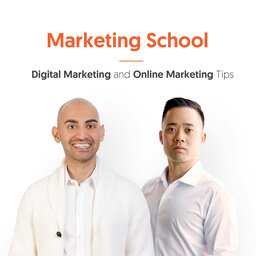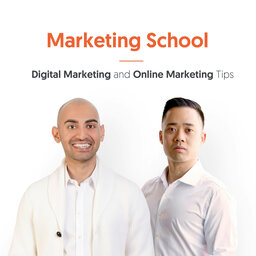How to Rank Higher on Google (Without Doing SEO) | Ep. #690
In episode #690, Eric and Neil discuss how you can rank higher on Google without using SEO. Tune in to hear why optimizing user experience is key.
TIME-STAMPED SHOW NOTES:
- [00:27] Today’s Topic: How to Rank Higher on Google (Without Doing SEO)
- [00:58] Check out Google Rank Brain.
- [01:10] There are backlinks, etc. but there is an ultimate factor that tells Google a result is relevant.
- [01:40] When you’re looking at user experience, bounce rate, etc., that is the ultimate signal that the result is relevant.
- [02:07] User experience is one of the most important aspects of a website. Optimize user experience.
- [02:20] Try UserTesting or UsabilityHub to examine your site.
- [02:45] Nothing beats talking to your users and hearing what they like and don’t like.
- [03:00] Once you have a big enough sample size, you can improve your site and rankings based on the solid amount of feedback.
- [03:25] If you are also trying to optimize for load times, try using GTMetrix to see how your site fares.
- [03:40] Eric’s site takes 10 seconds to load on mobile devices, which is far too long and it needs to be optimized.
- [04:15] When optimizing for usability, you need to test twice: once for desktops and another time for mobile devices.
- [04:30] You shouldn’t have separate mobile and desktop versions, just one killer site that works for everything.
- [05:15] Even if someone has an LTE or 4G phone, does not guarantee fast connections at all times.
- [05:36] When optimizing for user experience, make sure you’re running A/B tests.
- [05:58] Neil tested the pop-ups on his site and how it affected user experience on mobile and desktop.
- [06:27] That’s it for today!
- [06:33] Go to Singlegrain.com/Giveway for a special marketing tool giveaway!
Leave some feedback:
- What should we talk about next? Please let us know in the comments below.
- Did you enjoy this episode? If so, please leave a short review.
Connect with us:
Learn more about your ad choices. Visit megaphone.fm/adchoices
Marketing School - Digital Marketing and Online Marketing Tips
Neil Patel and Eric Siu bring you daily ACTIONABLE digital marketing lessons that they've learned th…Social links
Follow podcast
Recent clips

Mastermind Dinners: LeadGen That Actually Works in 2024
16:08

30M vs 500 Views - The One Change That Made All The Difference
12:35

AI concierge will affect dating - implications for business, Perplexity's AI-generated podcast, OpenAI dissolves team focused on long-term AI risks (less than one year after announcing it), Why swarming is killing SEO, and Ag1 spent $40m on podcasts
10:47
 Marketing School - Digital Marketing and Online Marketing Tips
Marketing School - Digital Marketing and Online Marketing Tips